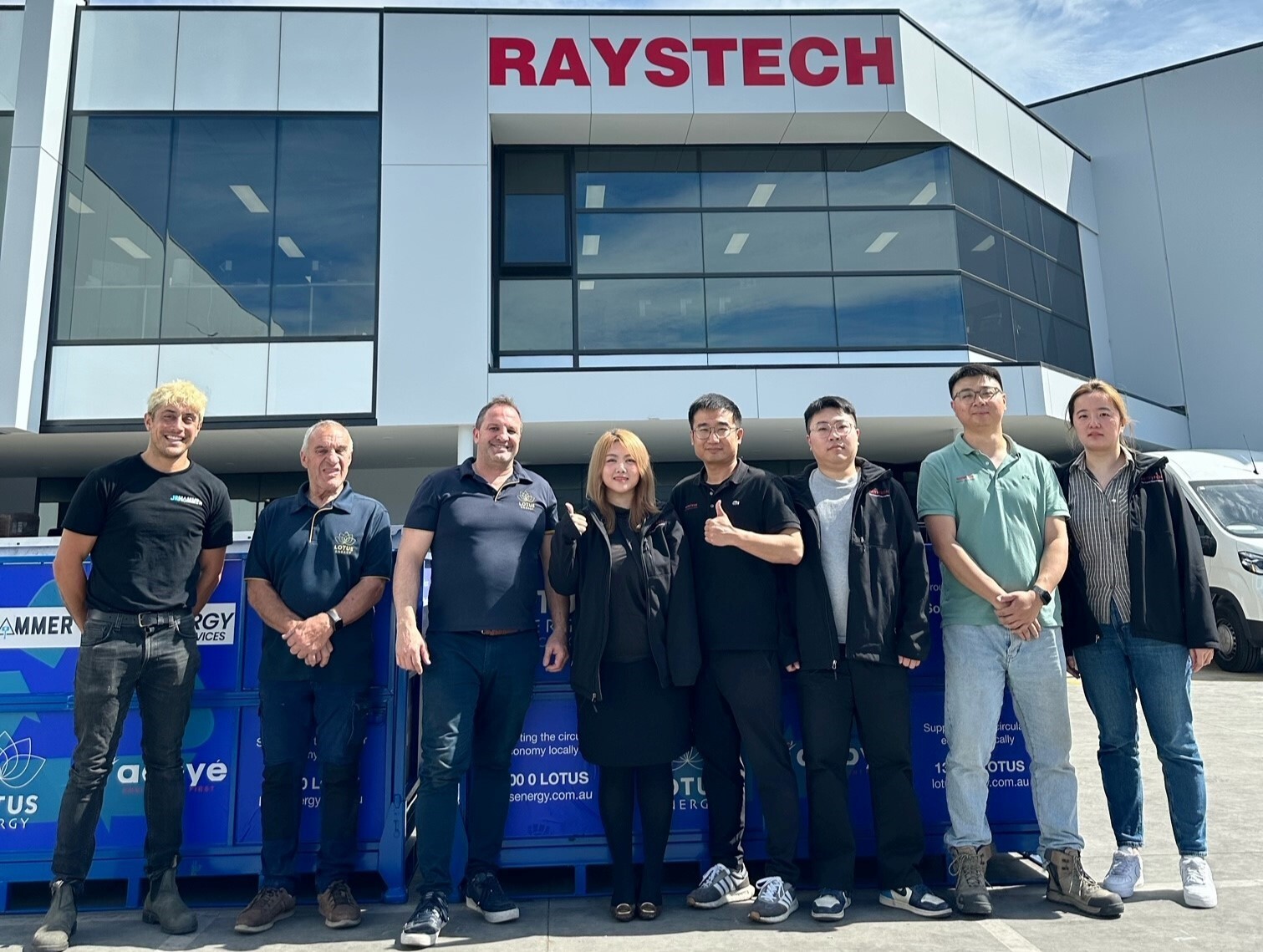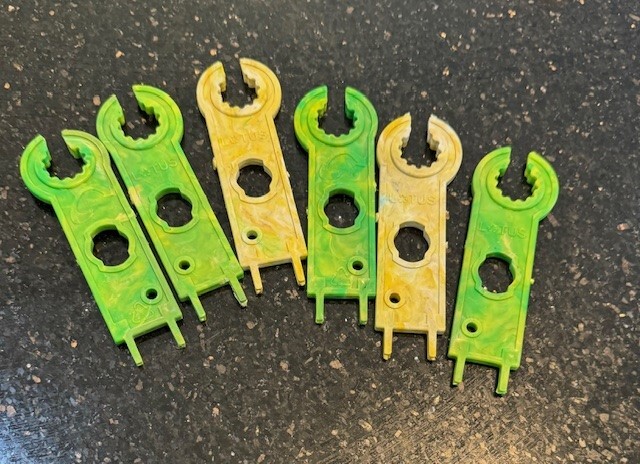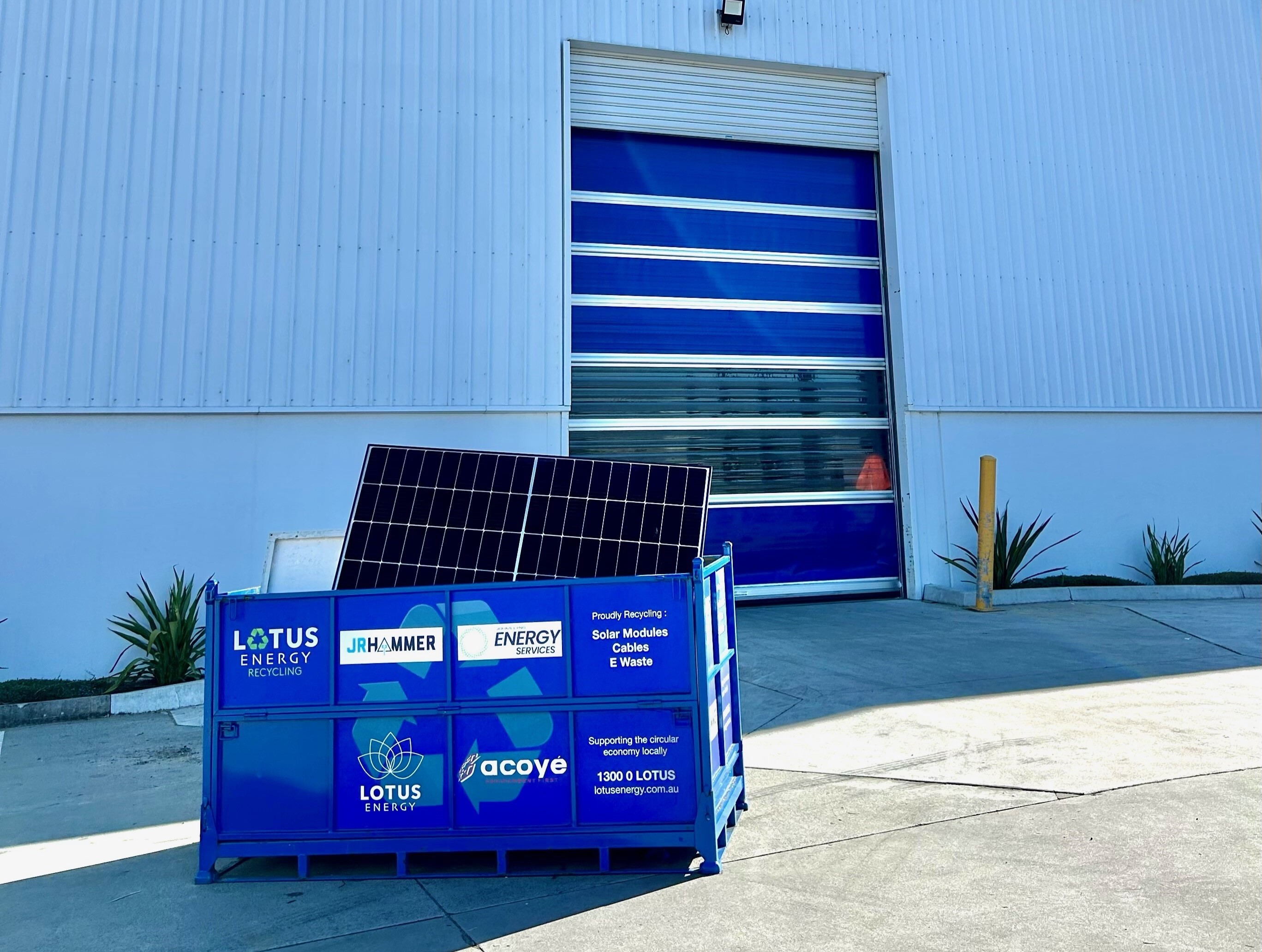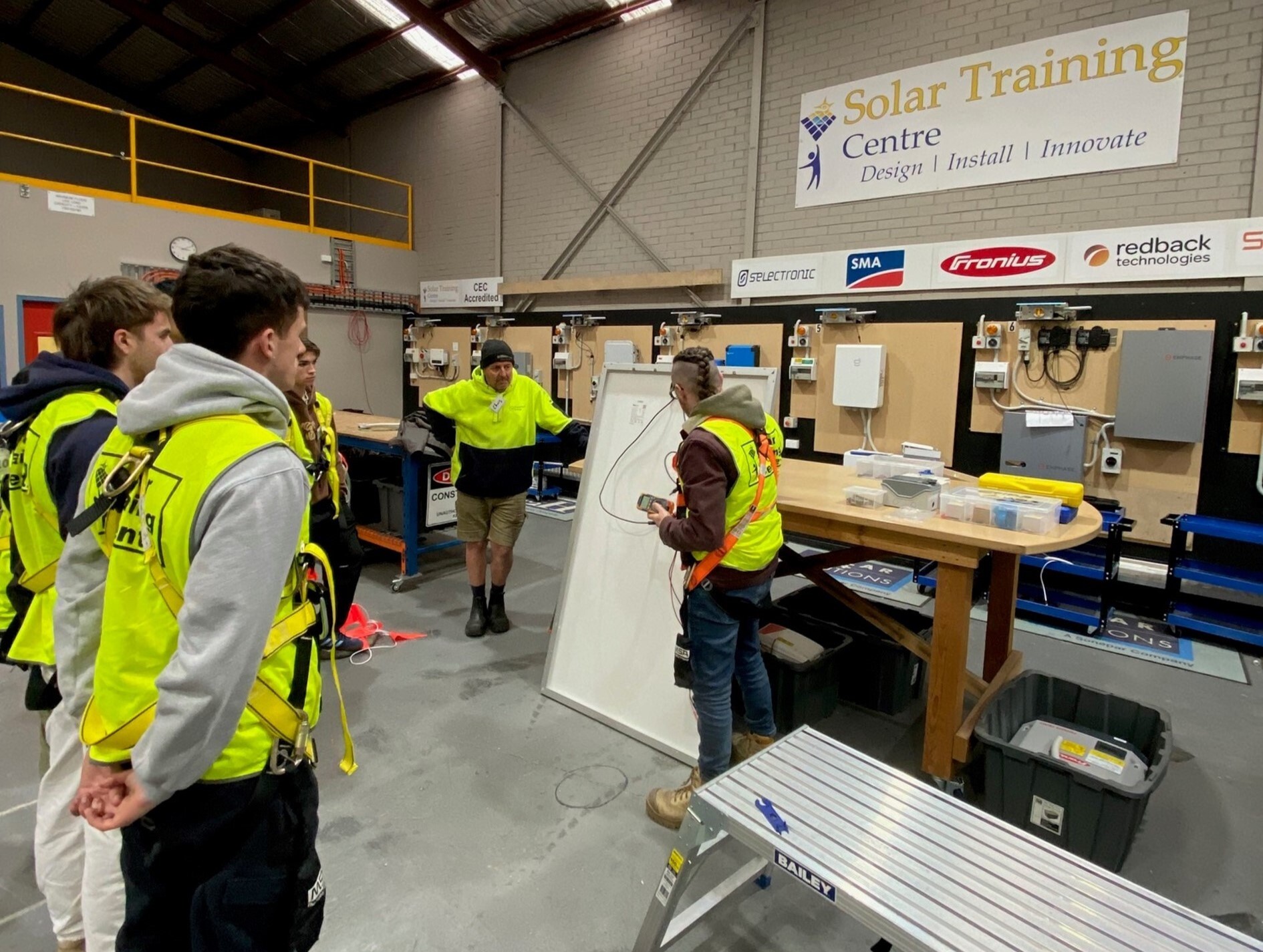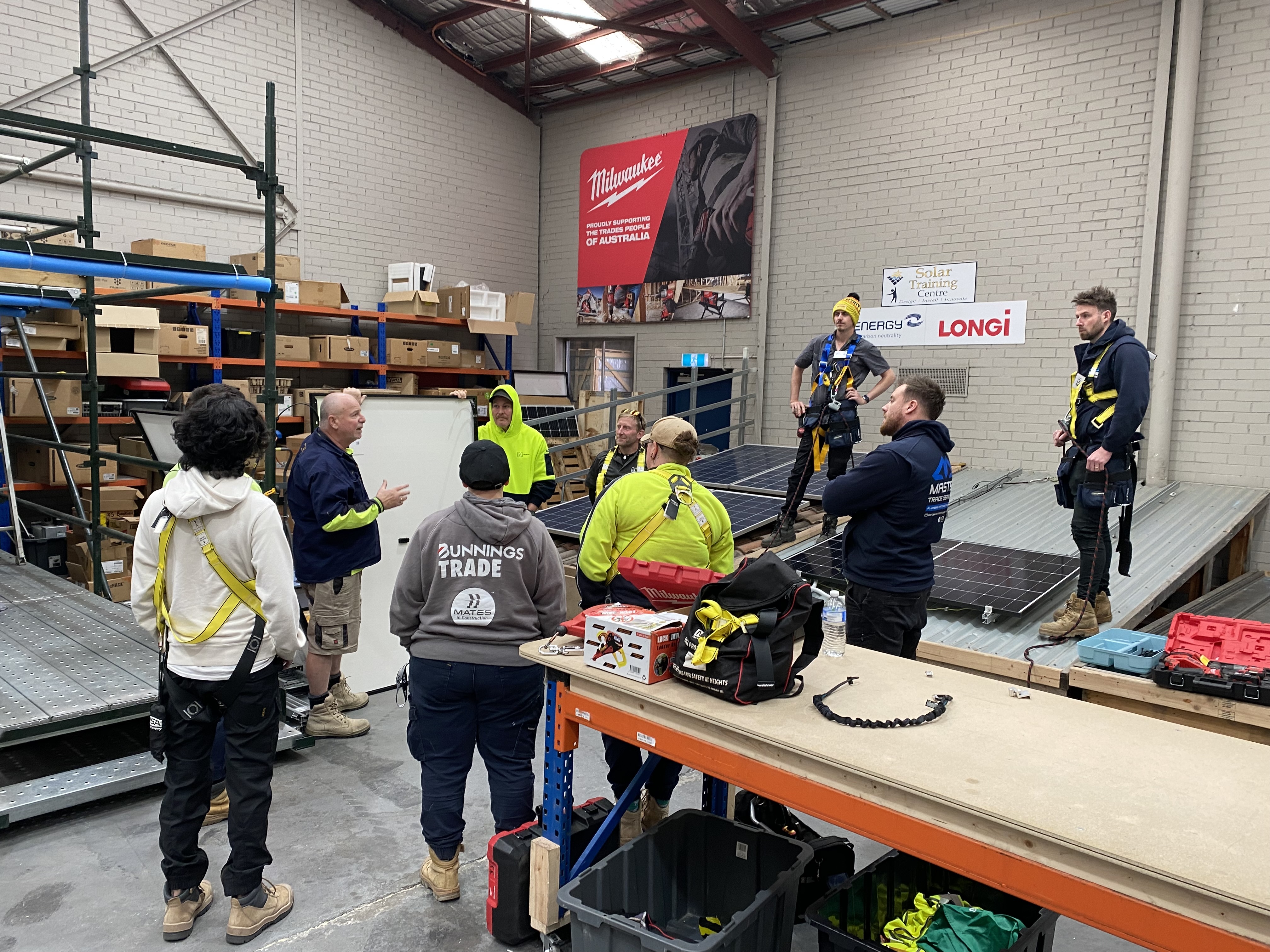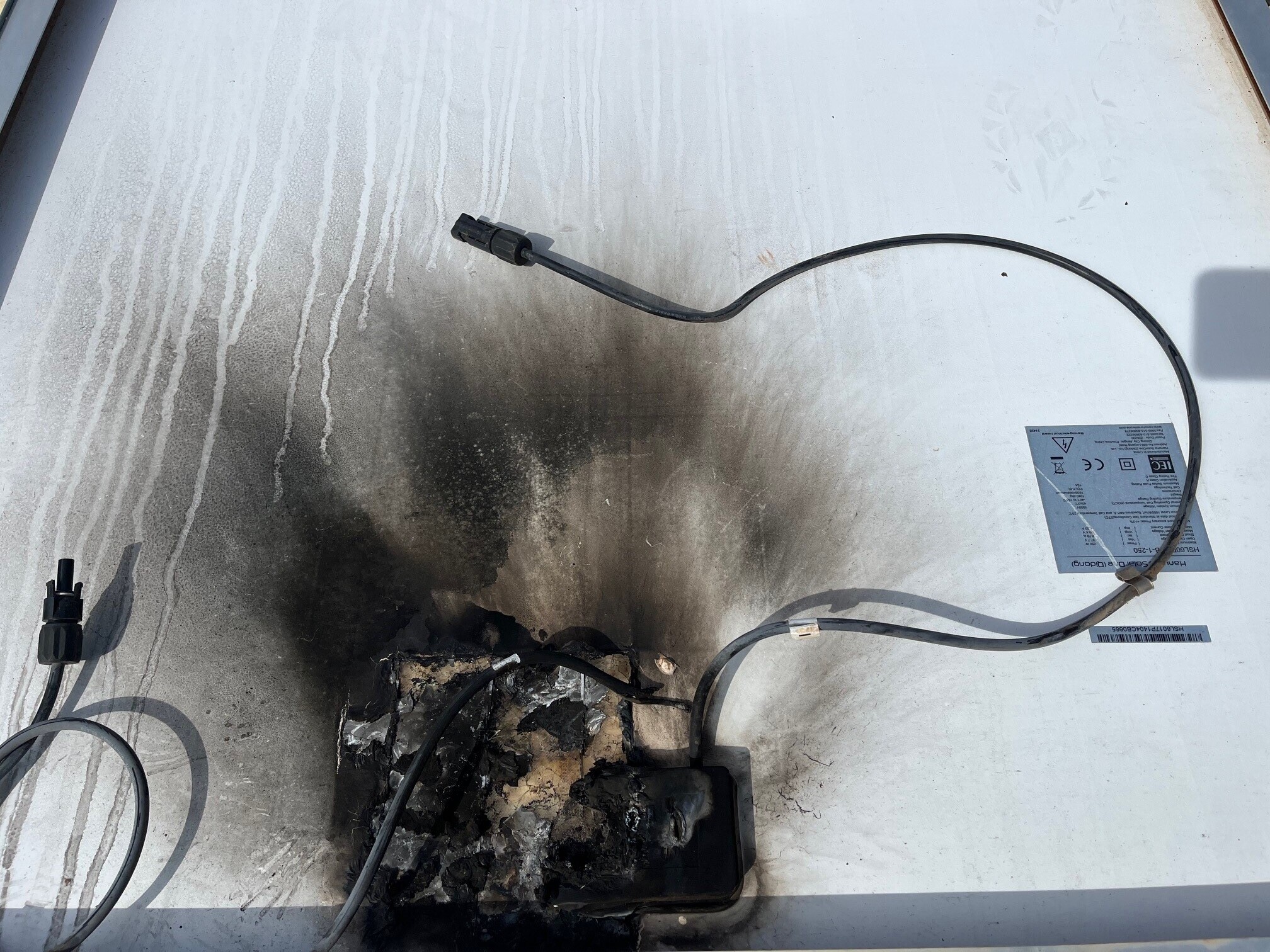Funded project – Development of Solar PV Reuse Protocols and National Accreditation Training Program
The development of Australia's first Solar-PV Reuse Protocols and nationally accredited training programme for safe solar panel decommissioning. Through establishing testing procedures for panel reuse, implementing collection stations, and training workers, the initiative significantly advanced solar panel circularity in Australia.
Background
There is an urgent need to address end-of-life solar panel management. The estimated amount of solar-PV waste in Victoria (report from 2023) is 3,967 tonnes and is projected to increase to 26,000 by 2035. A skilled workforce is required to ensure solar PV panels are decommissioned safely; many panels arriving at disposal facilities were observed to be in good physical condition but suffered from poor decommissioning techniques. Training for the workforce will provide jobs and employment opportunities for workers and small business opportunities for new and existing businesses Australia-wide.
The project, led by Lotus Energy Recycling in partnership with Solar Training Centre, Torus Group Electrical and Victoria University, was designed to prepare the solar-PV industry for its inevitable transition to a circular economy.
Torus Group Electrical provided technical expertise and managed specialised PASS/FAIL collection points where industry professionals could deposit decommissioned panels. These panels served as test subjects for Victoria University and Lotus to develop the Solar-PV Reuse Protocols—a visual testing system to assess decommissioned panels and determine their suitability for reuse—enabling their separation from recycling and waste streams. The Protocols incorporated visual inspections, thermal and luminescence scanning, and performance testing based on voltage and current outputs.
Solar Training Centre developed a nationally accredited qualification: "22679VIC Course in Decommissioning Solar PV for Safe Reuse or Recycling” which combined online theoretical learning with hands-on practical training and assessment. This course equipped industry professionals with essential skills and knowledge required for the safe removal solar PV, with a focus on using the Solar-PV Reuse Protocols as a driver of responsible and effective end-of-life management.
The course curriculum covered six key areas:
- Understanding end-of-life solar PV management
- Safe work practices with solar PV
- Decommissioning and ground transfer procedures
- Testing protocols for reuse/recycling suitability
- Visual inspection protocols
- Transportation loading procedures
The programme targeted existing industry professionals, including:
- Solar PV installers and recyclers
- Licensed electricians
- Electrical apprentices
- Trade assistants
- Transporters of solar PV panels
The pilot programme successfully trained 36 participants, comprising 32 electricians and 4 recycling centre workers, across three cohorts in two states. Participants were recruited through Solar Training Centre's professional network, Lotus Energy Recycling's connections, and other industry stakeholders, with training provided at no cost to attendees.
Stages
| 15/12/2023 | Project initiation: Sampling methodology established, and collaboration agreements signed |
| 15/02/2024 | Set-up of testing space and storage for Solar-PV panels at Torus Group Electrical |
| 11/03/2024 | Manufacturing and distribution of PASS/FAIL bins to collection points |
| 02/04/2024 | Development of Solar-PV Reuse Protocols |
| 14/06/2024 | Protocol verification through panel testing data analysis |
| 30/07/2024 | Employment of VRQA course development and assessment advisors |
| 30/08/2024 | Development of learning materials for nationally accredited course |
| 13/12/2024 | Course pilot completion and VRQA accreditation achieved |
Outcomes – what worked?
The development of the nationally accredited training course for safe handling and decommissioning of solar panels was a key achievement, complemented by the establishment of the Solar-PV Reuse Protocols for reuse and repurposing.
The project exceeded its targets:
- 36 workers completed the training program, with all participants reporting improved understanding of circular economy principles
- Established partnerships with six major solar companies for ongoing collection points
- Created 15 full-time equivalent positions across partner organisations
- Collected 39,280 solar panels in the PASS/FAIL bins, thereby diverting 1,508 tonnes of waste from landfill
- By implementing optimised sorting and reuse protocols, which reduced the number of solar panels sent through the recycling process, the project increased Lotus Energy's Victorian site processing capacity by 3,220 tonnes annually
An innovative solution emerged during the project with the creation of a recycled disconnection tool, manufactured from recycled bottle tops in partnership with Rethink Recycling. This tool addressed the common issue of improper cable disconnection, enhancing the potential for panel reuse.
Challenges
Project Timeline Constraints
The original project timeline allocated six months for qualification development (September 2023 to February 2024). This schedule would have allowed adequate time to develop comprehensive course materials and secure early VRQA accreditation, enabling Solar Training Centre to register the course on the National Training Register before project completion.
However, a delayed contract commencement shifted the effective start date, compressing the timeline and creating additional pressure to meet project objectives and reporting requirements.
Stakeholder Engagement
Managing relationships between multiple stakeholders presented some challenges throughout the project. Different organisational cultures and communication styles occasionally led to delays in decision-making processes and implementation of key project milestones. These experiences highlighted the importance of establishing clear communication protocols and expectations at the project's outset.
Insights to share with other businesses
Be brave with your ambitions—don't accept "standard practices". When you identify areas for improvement, make the changes and set new standards yourself. There are countless opportunities in the circular economy, and as the cost of resources continues to rise, those opportunities only grow.
Seek out like-minded industry stakeholders and collaborators. Aim for a diverse mix of government, not-for-profit and commercial partners. Engage with peak bodies and industry groups who can help shape your project's outcomes.
Test your theories on a small scale first and refine your processes. Scale up only after testing, to avoid multiplying potential issues. Don't aim for perfection in your first iteration—you'll never hit perfection on your first attempt.
What’s next?
Future plans include scaling up the training program to reach more of the 9,000+ industry workers through an ASQA application for qualification addition and development of a Continuing Professional Development course with Solar Accreditation Australia. This will help promote the course to existing accredited solar installers.
The established PASS/FAIL bin network will continue operating at partner sites, with several partners seeking to expand the program's reach.
From the grantee
"Lotus Energy Recycling was established to deliver a truly circular economy solution to the renewable energy industry. The CEBIC funding has aided in the vision for circular solutions by adding opportunity for professional industry training, awareness and new solutions for the reuse and repurposing of solar PV panels."
“As Australia's leading Registered Training Organisation delivering quality education programs in the solar and energy storage sector, Solar Training Centre strongly believes that extending the useful life of solar PV equipment through reuse or repurpose will improve economic outcomes and lower the environmental impacts of solar PV e-waste.”
